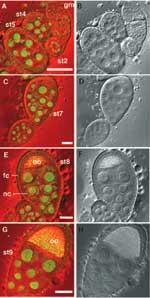The ongoing explosion of DNA sequence information, including determination of the complete sequence of the human genome, is creating a revolution in biomedical research. One startling concept that has emerged over the last decade is that similar genetic regulatory pathways control the normal growth and development of all animals. An important by-product of this observation is that the lessons learned from animal model systems can provide fundamental insights to the causes and potential cures for genetic diseases in humans.
The research programs in the Center for Developmental Genetics take advantage of the powerful tools that are available for studying gene function in several of the most important model systems, including fruit flies, frogs, and mice. The Center provides an important central source for investigators across the Stony Brook campus who have interests in studying the genetic basis of fundamental processes associated with human diseases. Especially notable is the third floor of the CMM, shared by the Center for Developmental Genetics and Cancer Genetics. This immediate juxtaposition will foster maximum synergy between investigators from these two thematically related research groups.

Section of mouse brain showing expression of a protease (dark color) in the hippocampus, the region of the brain responsible for learning and memory.
Important areas of research in the Center include:
Regulation of Gene Expression
Regulating the expression of genetic information is central to developmental biology. Research in the Center for Developmental Genetics studies the molecular mechanisms used to switch genes on and off during embryonic development. These studies provide information on the functions of genetic regulators that are essential for the development of bone and blood, and yield important insights to the effects of mutations associated with leukemia.
Signal Transduction
Signaling pathways play pivotal roles in controlling both proliferation and differentiation during development. Work on one of these pathways has revealed new strategies that can be incorporated into the development of therapeutic treatments for colon and pancreatic tumors.
Cell Development and Function
Key molecules are required for the proper development and function of cells that make up our nervous system. One set of studies investigates genetic defects that may lead to deafness. Work on another project has provided important information on the pathways responsible for neuronal degeneration during stroke.
Genetic Diseases
Mouse models are being developed for human genetic diseases. One project here has identified a gene that may be responsible for the birth defects that lead to cleft palate in humans.

Expression of grauzone during Drosophila oogenesis viewed by confocal microscopy. Grauzone mutations disrupt embryonic development.
